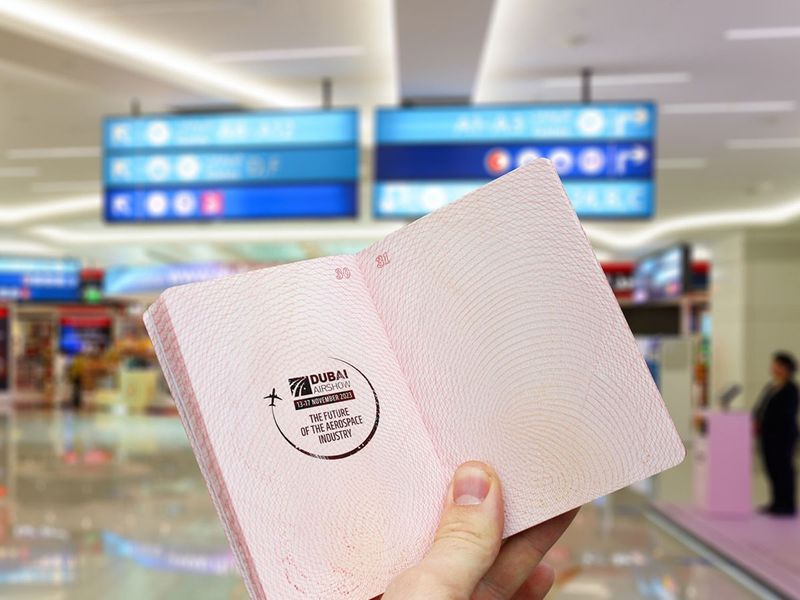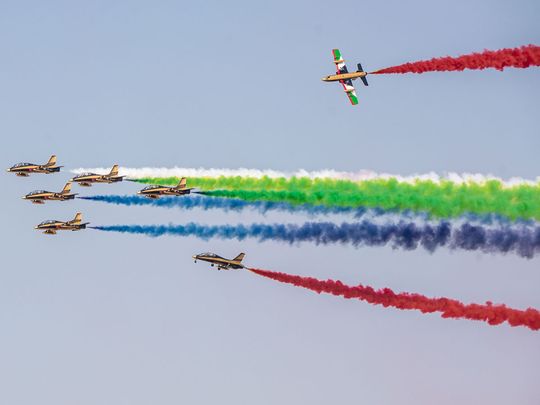Dubai: As the latest edition of Dubai Airshow opens Monday (November 13), the intense interest is which UAE or Gulf airlines will be making those fleet expansion orders.
In this regard, three carriers – Emirates, flydubai and Riyadh Air – will have the spotlight trained on them, with any orders going a long way to help the aviation industry close out what has been an exceptional year in style.
Many airlines are seeking to modernize by bringing in more fuel-efficient aircraft, while expanding or renewing their fleet to meet the sustained resurgence in global travel. Emirates, flydubai, and Saudi Arabia’s Riyadh Air have since early this year hinted at their interest at getting more wide and narrow-body aircraft. And that may be the trigger for the latest Dubai Airshow to beat all previous records on aircraft orders.
At the 2021 event, Airbus walked away with 404 orders, with Boeing with 101.
Plans for UAE carriers
- * Tim Clark, President of Emirates, hoped to get the long-delayed 777-9 version between July and October 2025.
- * flydubai, which operates an all-Boeing fleet, also said it was discussing a new order of narrow-body aircraft. CEO Ghaith Al Ghaith had acknowledged in September that the airline fell short of its passenger-carrying expectations over the summer due to delays in aircraft deliveries, specifically the Boeing 737 MAXs. Al Ghaith said the carrier remains ‘extremely interested’ in further aircraft acquisitions.
Aviation industry analyst John Strickland of JLS Consulting said, “On paper, manufacturers order books are full several years ahead, but we can expect some new announcements at the Dubai show.”
“flydubai has indicated for some time that it has been planning a new order and studying options from Airbus – as well as its current supplier Boeing.”
Strickland said that Emirates – which last week announced record half-year results – has significant new orders to come but will be looking beyond these to its needs in the next decade, when it will need to start replacing its large A380s.
“That is a complex decision as no other aircraft of similar size is available,” said Strickland.
Riyadh Air to unveil second livery
“Saudi airline Riyadh Air is in the market for a short-haul fleet, having announced orders for long-haul Boeing 787s,” he added. “So, there may be news on this at the show.”
The airline has also confirmed its plans to unveil a second livery – its CEO Tony Douglas (formerly the chief of Etihad Airways) will be in attendance. “Riyadh Air needs to finalize their order for a narrow-bodied fleet, and doing so in Dubai signifies their vision for much of their future connecting traffic,” said OAG’s John Grant.
Bloomberg had reported the new Saudi airline is nearing an order for up to 100 Boeing 737 MAXs, with a final agreement possibly being announced during the Air Show. While the exact details remain to be seen, the expectation is that the airline will place a firm order for 50 737 MAXs, with options for an additional 50.
Marking its return to the airshow this year will be Qatar Airways, which will bring its A350-1000 and 787-9 for the static display. However, the airline has made no new commitments on new aircraft orders.
What to expect Airshow ‘23
Over 1,400 exhibitors from 95 countries across the aerospace, space and defence spectrum will gather at the Dubai Airshow site — Dubai World Central from November 13-17. This includes 400 first-time exhibitors and 80 plus startups across sectors, including commercial aviation, advanced aerial mobility, space, defence and military, business aviation, and air traffic management. An expanded space pavilion, in partnership with the UAE Space Agency, will be a key feature at this year’s edition.

Image Credit: Supplied
Supply chain concerns
According to Linus Bauer, Managing Director of Dubai-based Bauer Aviation Advisory, regional carriers may still be in the market for new aircraft despite supply chain challenges.
According to him, supply chain challenges, including delays in aircraft deliveries and rising costs, might influence the types and quantities of orders placed.
As a mitigation measure, airlines might opt for smaller orders and focus on manufacturers who have shown better resilience in handling supply chain issues. “They might also explore different financing options or leasing arrangements to manage capital expenditure,” added Bauer.
Plane manufacturer Boeing has said it is ‘working intensely on meeting quality’ to iron out issues related to the 737s. Boeing’s Randy Heisey said, “We’ve worked throughout our supply chain, putting some senior executives embedded with some of our suppliers, and focused extensively within our own four walls on ensuring that we meet our customers’ expectations.”
However, Grant said, ‘While the issue of aircraft deliveries and supplies persists, airlines operate with long-term planning in mind, looking several years ahead rather than just focusing on 2025. Joining the order queue is inevitable, and spaces can unexpectedly open up in those order books, as seen in past experiences. The Middle East remains one of the fastest-growing aviation markets, especially with the ongoing Saudi Vision 2030 project.”
Biggest aircraft deals of 2023*
- IndiGo: 500 Airbus planes for $50 billion
- Air India: 470 planes from Airbus and Boeing for $70 billion
- Riyadh Air and Saudia: 121 Boeing jetliners (78 confirmed + 48 on option) for $37 billion
- Southwest Airlines: 108 Boeing planes
- United Airlines: 110 planes from Boeing and Airbus for $22.4 billion
- Air Canada: Firm order for 18 Boeing Dreamliners
- Air France-KLM: 50 Airbus A350s for $16 billion
Narrow-body is top choice
According to ADS Group, a whopping 440 per cent increase has been reported year on year in aircraft orders compared to August 2022.
“In total, 1,941 aircraft orders have been placed with orders for single-aisle aircraft continuing to dominate market demand with 1,584 ordered compared to 357 wide-body orders year to date,” said the report. The orders for wide-body aircraft might be more gradual, reflecting the slower recovery in international long-haul travel.
Sustainable fuel
Regional airlines are making narrow-body, fuel-efficient aircraft a top priority for their fleets, seeing them as a means to enhance flexibility and fuel economy. They’re pushing to achieve sustainability goals, with Emirates already running sustainable aviation fuel (SAF) flights from Dubai International Airport.
GE Aerospace’s Aziz Koleilat said Abu Dhabi’s Etihad is testing solutions, including SAF-powered flights, route planning, and making other adjustments to cut fuel use.

